GERALD SCHOENFELD THEATRE – 236 W. 45th
Where do you draw the line?
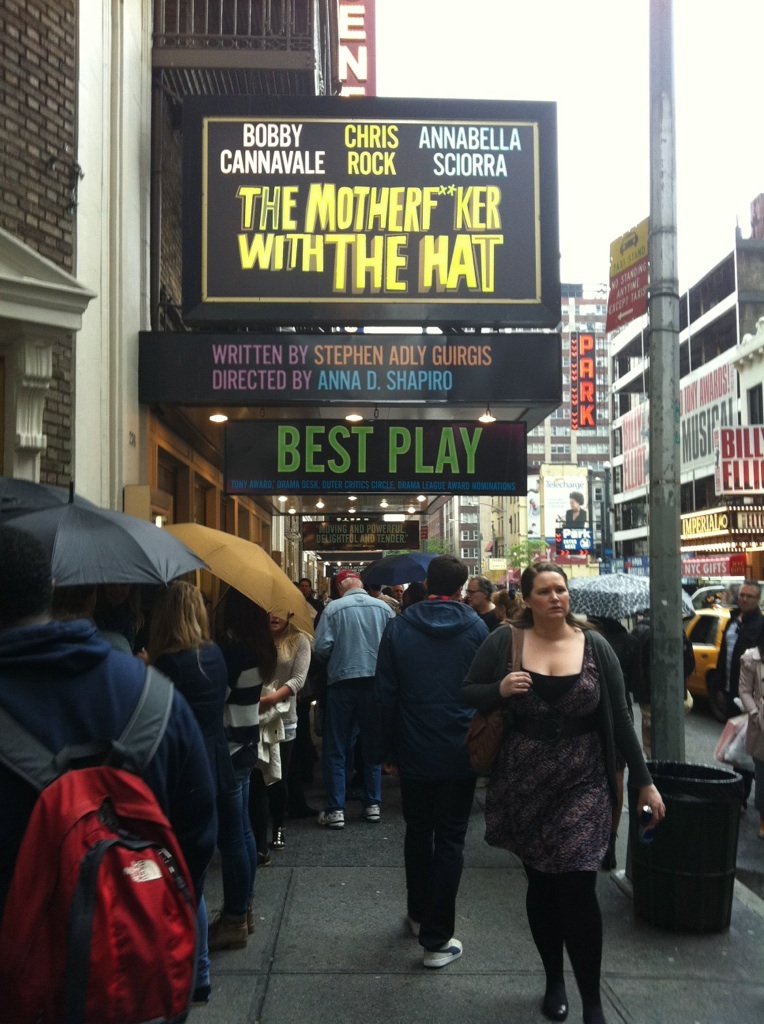
THE MOTHERF**KER WITH THE HAT, by Stephen Adly Guirgis and directed by Anna D. Shapiro, makes its world premiere on Broadway starring Bobby Cannavale, Chris Rock, Elizabeth Rodriguez, Annabella Sciorra and Yul Vázquez.
THE MOTHERF**KER WITH THE HAT is a new high-octane, verbal cage match about love, fidelity and misplaced haberdashery from playwright Stephen Adly Guirgis. Jackie and Veronica have been in love since the 8th grade. But now, Jackie is on parole and living clean and sober under the guidance of his sponsor, Ralph D, while still living with and loving his volatile soul mate Veronica who is fiercely loving, but far from sober. Still, their love is pure. And true. Nothing can come between them – except a hat.
The Most Nominated New Play of the Season!
EXTENDED THROUGH JULY 17th!
“VIBRANT, HILARIOUS, MARVELOUSLY INTENSE, AND BLAZINGLY GOOD.” – Ben Brantley, The New York Times
“MAKES THE AUDIENCE ROAR WITH RECOGNITION – Michael Musto, Village Voice
“MOVING AND POWERFUL, DELIGHTFUL AND TENDER.” – Mark Kennedy, Associated Press
“CHRIS ROCK DELIVERS! HIGHLY ENTERTAINING. ROCK HAS FLAWLESS TIMING.” – Scott Brown, New York Magazine
“A JOY TO BEHOLD. ONE OF THE BEST PLAYS IN AGES.” Terry Teachout, The Wall Street Journal
THE MOTHERF**KER WITH THE HAT is a new high-octane, verbal cage match about love, fidelity and misplaced haberdashery from playwright Stephen Adly Guirgis. Jackie and Veronica have been in love since the 8th grade. But now, Jackie is on parole and living clean and sober under the guidance of his sponsor, Ralph D, while still living with and loving his volatile soul mate Veronica who is fiercely loving, but far from sober. Still, their love is pure. And true. Nothing can come between them – except a hat
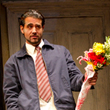



New York Times Review:
THEATER REVIEW
‘THE ___________ WITH THE HAT’
A Love Not at a Loss for Words
The play that dare not speak its name turns out to have a lot to say.Stephen Adly Guirgis’s vibrant and surprisingly serious new comedy opened on Monday night at the Gerald Schoenfeld Theater under a title that cannot be printed in most daily newspapers or mentioned on network television.
This is vexing for those of us who would like to extol the virtues of “The ___________ With the Hat,” at least in public. (The title also seems to have created problems for the people trying to publicize the play.) This is by far the most accomplished and affecting work from the gifted Mr. Guirgis, a prolific and erratic chronicler of marginal lives (“Jesus Hopped the ‘A’ Train,” “Our Lady of 121st Street”). But I’ll admit that upon first hearing the name of his play, I thought irritably, “How the ___ am I going to write about it?” As you see, I have already devoted much space-consuming ink to my quandary.
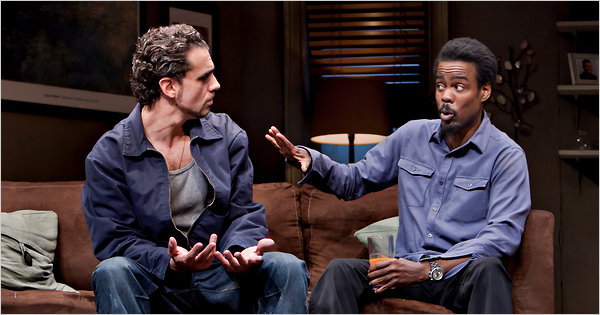
The New Yorker Review:
THE THEATRE
War Games
Battles at home and abroad.
Spend some time on the upper Upper West Side of Manhattan, where the forty-six-year-old Stephen Adly Guirgis grew up, the son of an Irish mother and an Egyptian father, and you can still hear the notes in the scale of his theatrical repertoire: black, Jewish, and Latino voices that meet and crash and land on the predatory streets that his characters sometimes stalk far into the night, in search of a little coke, perhaps, or some Chicken McNuggets. Although Guirgis’s scripts are short on detail when it comes to the spaces his characters inhabit, you can picture them from the way the characters talk and express—or don’t express—their aspirations. Guirgis, a brilliant comedic talent—who began his stage career at the LAByrinth Theatre Company, where Philip Seymour Hoffman, a co-founder, directed his early work with great compassion—also has an original and knowing take on class, particularly as it plays out among the bottom-of-the-barrel working-class poor, who are virtually invisible to the wealthier men and women around them. Guirgis’s characters are strivers who lack the language to “pass” in a white-collar world; they’re frustrated by limitations that they’re only half aware of, and that frustration provides much of the painful hilarity in their dialogue, which piles miscommunication on top of misunderstanding.
In Guirgis’s seventh full-length play, “The Motherf**ker with the Hat” (at the Gerald Schoenfeld), audience members are treated to the author’s customary craftsmanship and themes, but his characters’ interior lives feel a little more considered than they have in the past. This is not to say that Guirgis’s first foray on Broadway is any less hysterical and irreverent than his previous works, which include “Jesus Hopped the ‘A’ Train,” an outstanding 2000 piece about imprisonment and moral responsibility, and the 2003 comic epic “Our Lady of 121st Street,” which shows how the past can overwhelm and distort the present. After the inventive and poignant “The Last Days of Judas Iscariot,” which follows the life and career of history’s most famous fallen angel, premièred at the Public, in 2005, one could only wonder where Guirgis would go next. But “The Motherf**ker with the Hat” builds on the strength of those plays and then surpasses them. From the beginning of this elegiac, exhilarating, hundred-minute, intermissionless work, which is surely handled by the director Anna D. Shapiro, you can’t help noticing that Guirgis has shaken his habit of setting up ideas and situations for his characters to fit into; instead, full-blooded people take over and tell the story for him.
Veronica (Elizabeth Rodriguez) and Jackie (Bobby Cannavale) are in their late twenties. They live in a Times Square S.R.O., but it’s their love that hems them in. Jackie, out on parole, is newly sober. As the play opens, Veronica is doing lines of coke while cleaning the apartment and talking to her mother on the phone. She feels that her mother is too strung out, and that she’s wasting time with the wrong man, and she’d like to get her into rehab. Vibrating with coke nerves, Veronica says, “Ma? O.K., look, for the last time, my opinion, you’re still a good-lookin’ woman with a huge, lovin’ heart and you’re not hard to please—clearly—but you’re dating a fuckin’ big-time loser with a head like a actual fuckin’ fish! . . . O.K., like, please, alls I’m gonna say, Ma, when you see him tonight: Take a moment. Take a breath. Take a real good look and just ax yourself in all honesty, ‘Do I wanna fuck him or fry him up with a little adobo and paprika?’ ” Jackie enters. He’s high on his new job at FedEx and on his love for Veronica, which hasn’t abated since they first met, as teen-agers. He looks as if he’d just stepped out of an eighties porno flick: slicked-back hair, a six-pack, skinny, muscular legs. (When he undresses, we see that he’s wearing a pair of white tube socks.) Jackie wants to make love, but Veronica has something on her mind. She’s been seeing someone else, but won’t say whom. Is it their downstairs neighbor, the motherfucker with the hat? No, it turns out that Veronica has been with Jackie’s A.A. sponsor, the homily-spewing, vegetable-juice-drinking Ralph D. (Chris Rock, in his Broadway début). Meanwhile, Ralph’s bitter, disaffected wife, Victoria (Annabella Sciorra), has the hots for Jackie—though you get the sense that she’d be into any man who paid her some attention. As Jackie’s world unravels, he calls on his wise, sardonic cousin, Julio (the phenomenal Yul Vázquez), who has Jackie’s back but not unconditionally: he tells Jackie exactly how self-obsessed he’s been.
Jackie and Veronica, as played by the astonishing Cannavale and Rodriguez, are two hopeful losers who want to win the kind of intimacy they’ve seen in movies, but for whom it’s always just out of reach. Even if life were to hand the savvy and deluded Veronica a chance at happiness, she wouldn’t be able to grab the brass ring. She and Jackie both desperately need and avoid each other. The interplay of their desire and their deceit makes them one of the most beautifully drawn couples to appear on the stage in years. As the play goes on, we watch the very notion of rehabilitation unravel, too. Guirgis isn’t anti-A.A. or anti-N.A., but he doesn’t shy away from the reality that exists offstage, as it were, in a world that isn’t protected by anonymity and trust. He knows enough about life to ask the right questions: What is recovery? And who, if anyone, can recover from the brutal high of a love hangover?
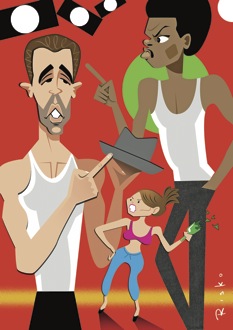

Read more http://www.newyorker.com/arts/critics/theatre/2011/04/25/110425crth_theatre_als#ixzz1NItsypRV
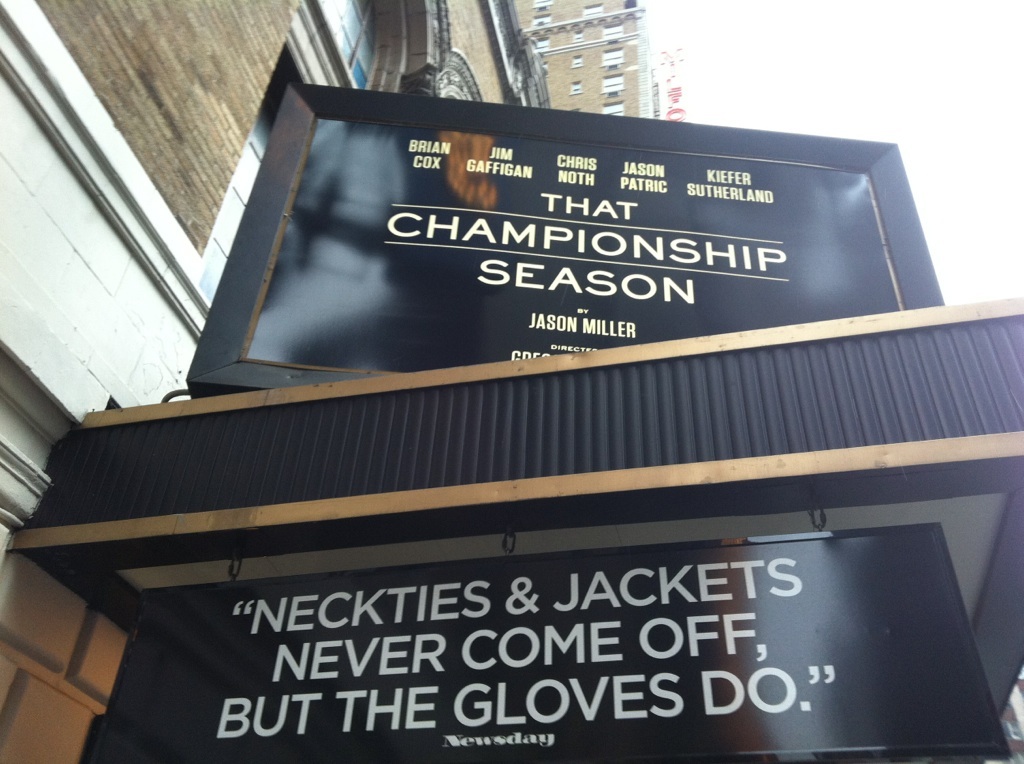
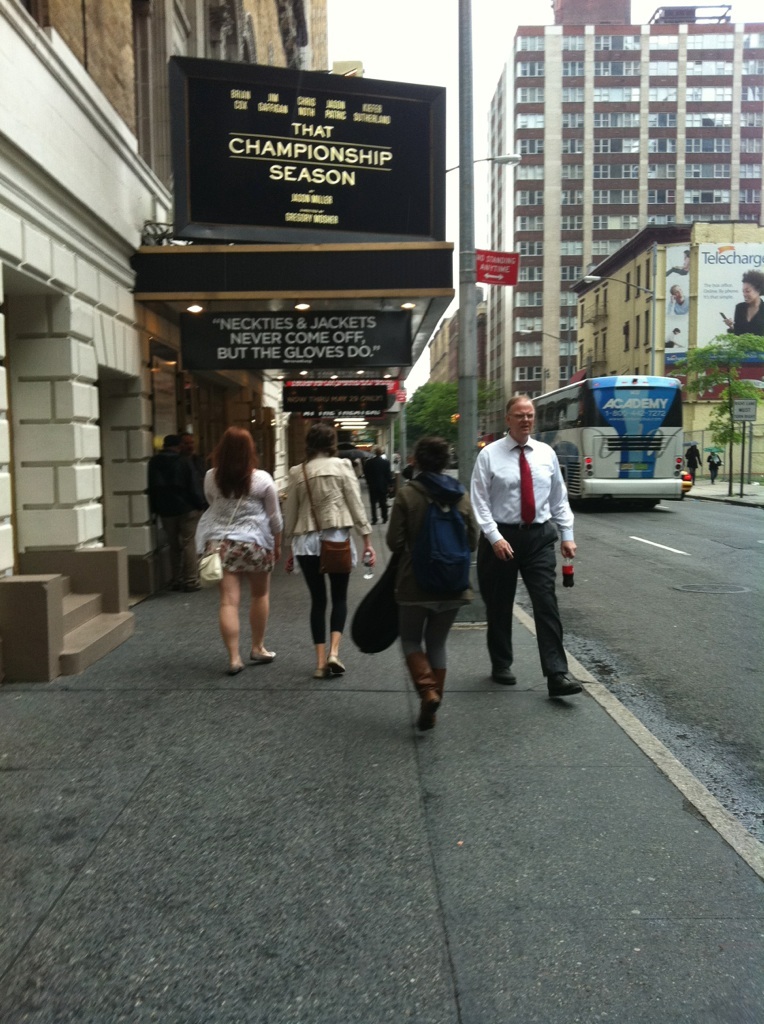
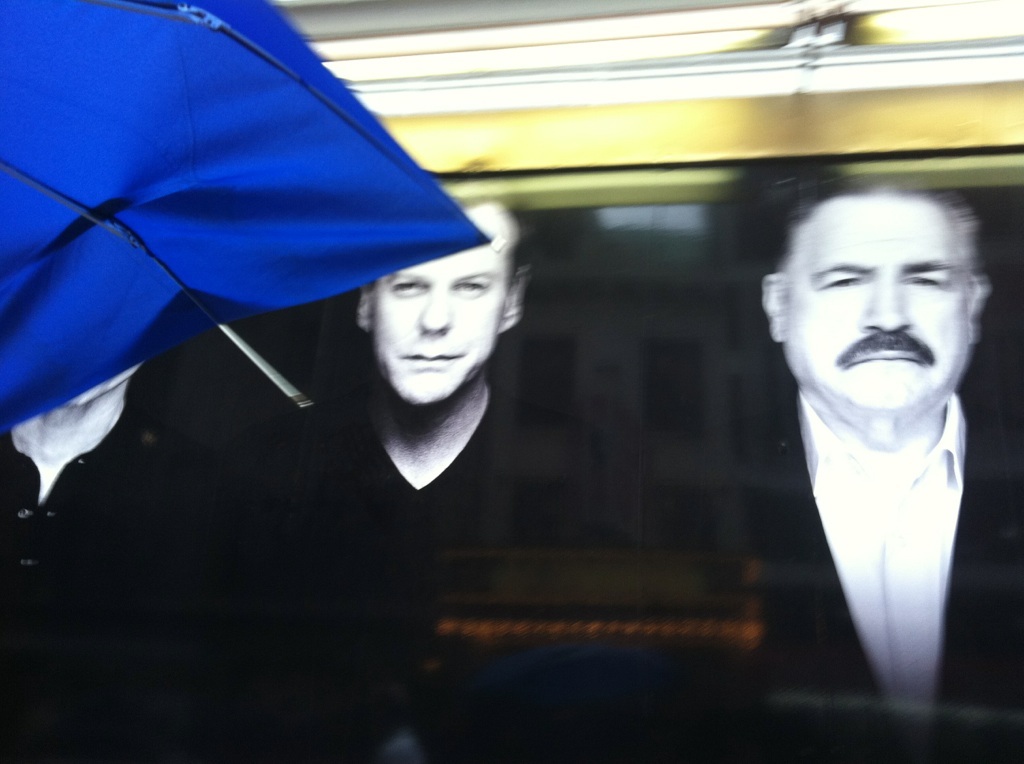



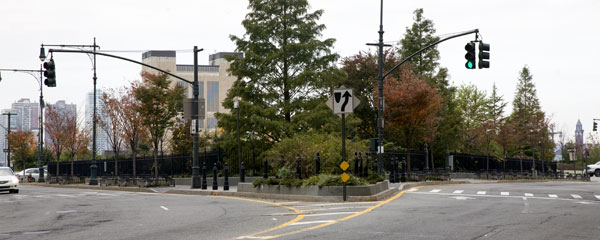









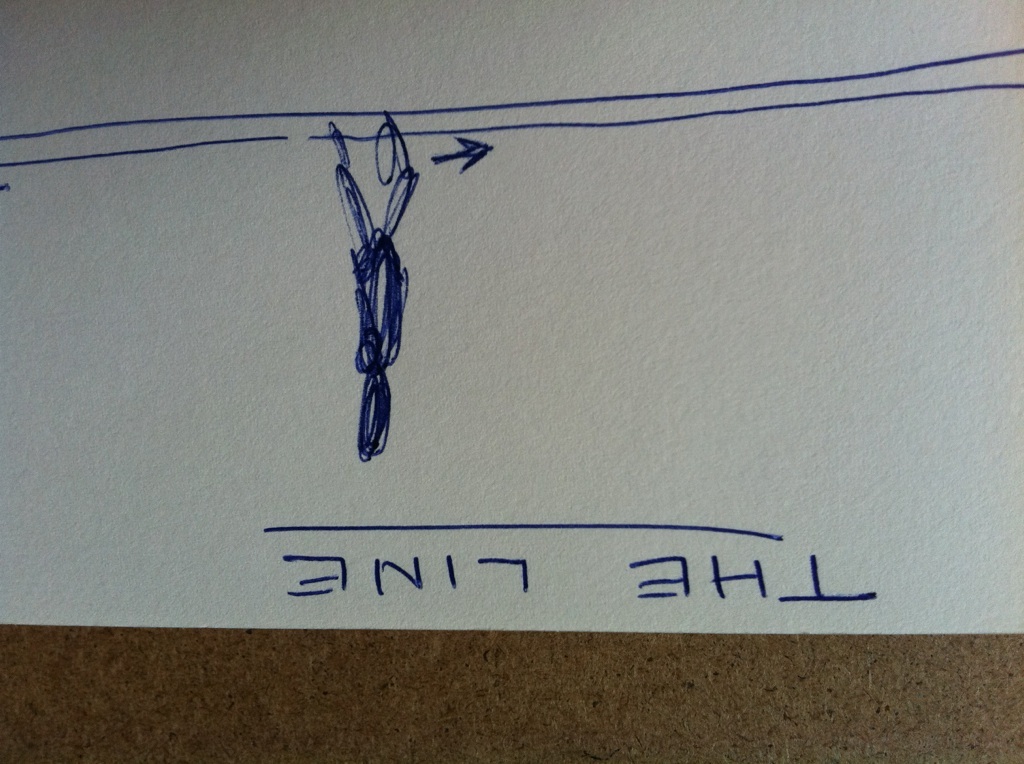
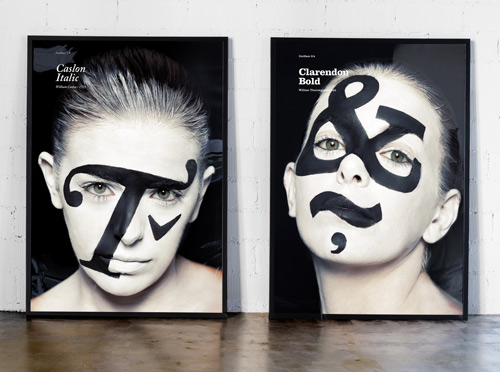
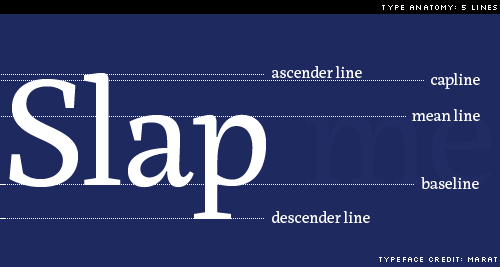


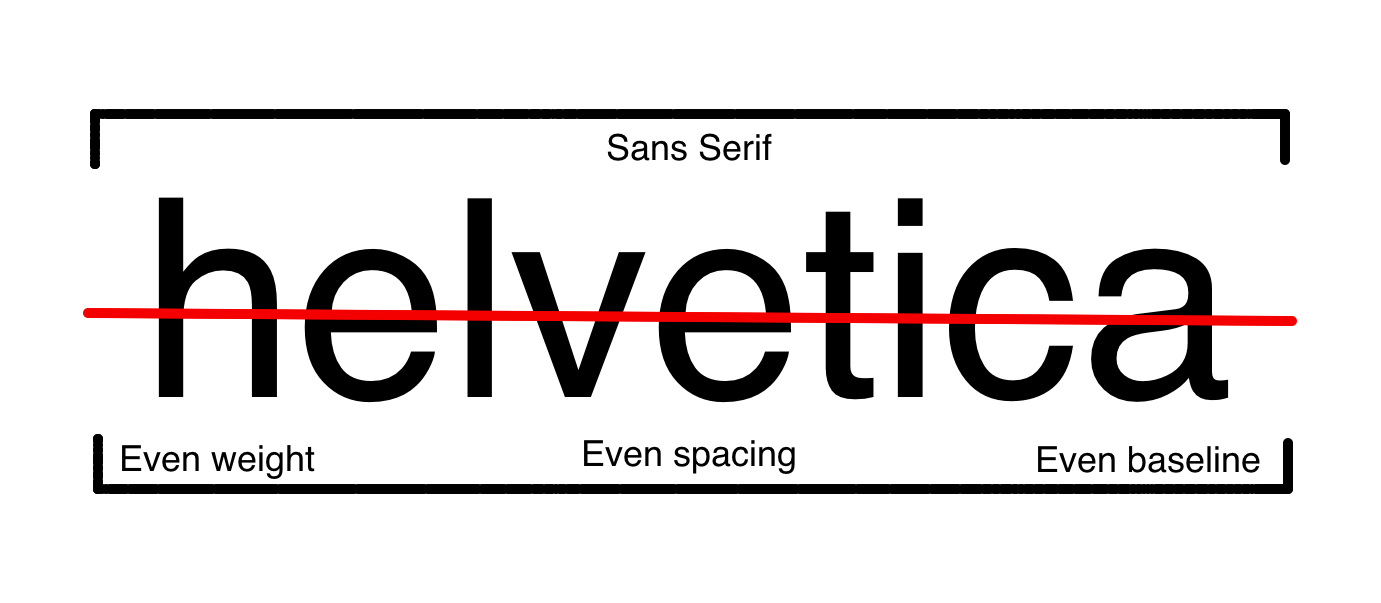
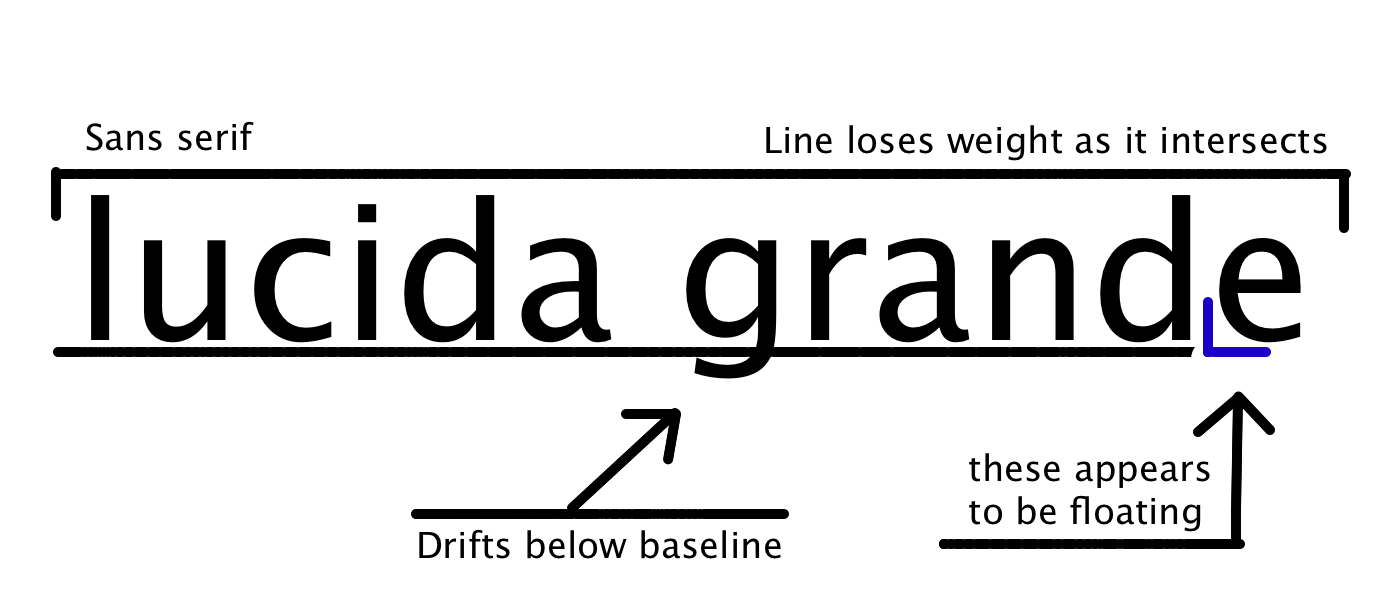

 Street Lines by Thomas Marin
Street Lines by Thomas Marin





